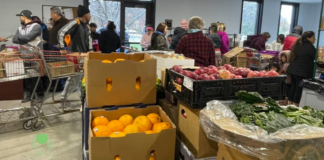When writing a post about my experience with postpartum anxiety disorder, I heard from a lot of women in the community who were wanting to share their stories to help others. I was grateful to have Katherine Schuknecht reach out and write this snippet for our readers.
The most important message I want any woman suffering from a perinatal mood or anxiety disorder to hear is this: you are not a bad mom, and you have done nothing wrong. You are strong; you are powerful; you can fight this, and you can win. This is an illness, and you can get better with professional care.
Perinatal mood or anxiety disorders can manifest in so many ways. Perinatal mood and anxiety disorders include: postpartum depression, postpartum anxiety, postpartum post-traumatic stress disorder, postpartum OCD, and postpartum psychosis. Women can also experience pregnancy (or antenatal) depression, which is just as serious as postpartum depression.
We all know it’s normal for moms to feel exhausted those first few weeks. It’s when those feelings of exhaustion or anger or sadness or irritability won’t stop – or continue to get worse – that’s it important to seek professional care. Some women aren’t aware that symptoms can show up any time within the first year postpartum, and can last well beyond that.
A lot times women may not even recognize their own symptoms. Many of the women who have survived a perinatal mood or anxiety disorder describe it as being “in a fog.” That’s why it’s so important for all moms to know it’s okay to reach out for help when they’re feeling lonely or exhausted. Call your family or close friends or postpartum doula; ask them to come over and keep you company. Talk to them about how you’ve been feeling; really share with them. Let them take care of you and the house for a bit. Ask them to snuggle the baby so you can eat or shower or nap.
Postpartum Progress (postpartumprogress.org) is an amazing resource for women who are suffering from a perinatal mood or anxiety disorder and those who have survived. It has a fabulous New Mom Checklist (*link below) that I pass out to all of my clients and expectant friends. It is such a great tool for women to use to check in with themselves, and it helps facilitate a conversation between women and their care providers.
If you think you need professional care, call your midwife or OB or therapist, and if they can’t give you the support you need, keep fighting until you find someone who can.
http://postpartumprogress.org/climb-out-of-the-darkness/ and the local facebook site https://www.facebook.com/climboutteammadison/
You can see the first part of our Postpartum series here













Thank you for shedding some light on this dark tunnel in motherhood. Education fuels awareness and those are both great tools in fighting this disease. You are a warrior, brave and strong!
Bravo! I hired Kat as my postpartum doula after my daughter was born. Because it was my second pregnancy, I didn’t anticipate needing help. I thought my husband and I could handle it alone, because we did the first time. I was wrong, but I’m so glad I had Kat on my side through those early dark days.
Chris, thank you so much for these kind words! It was such a pleasure working with your family and getting to know you better.